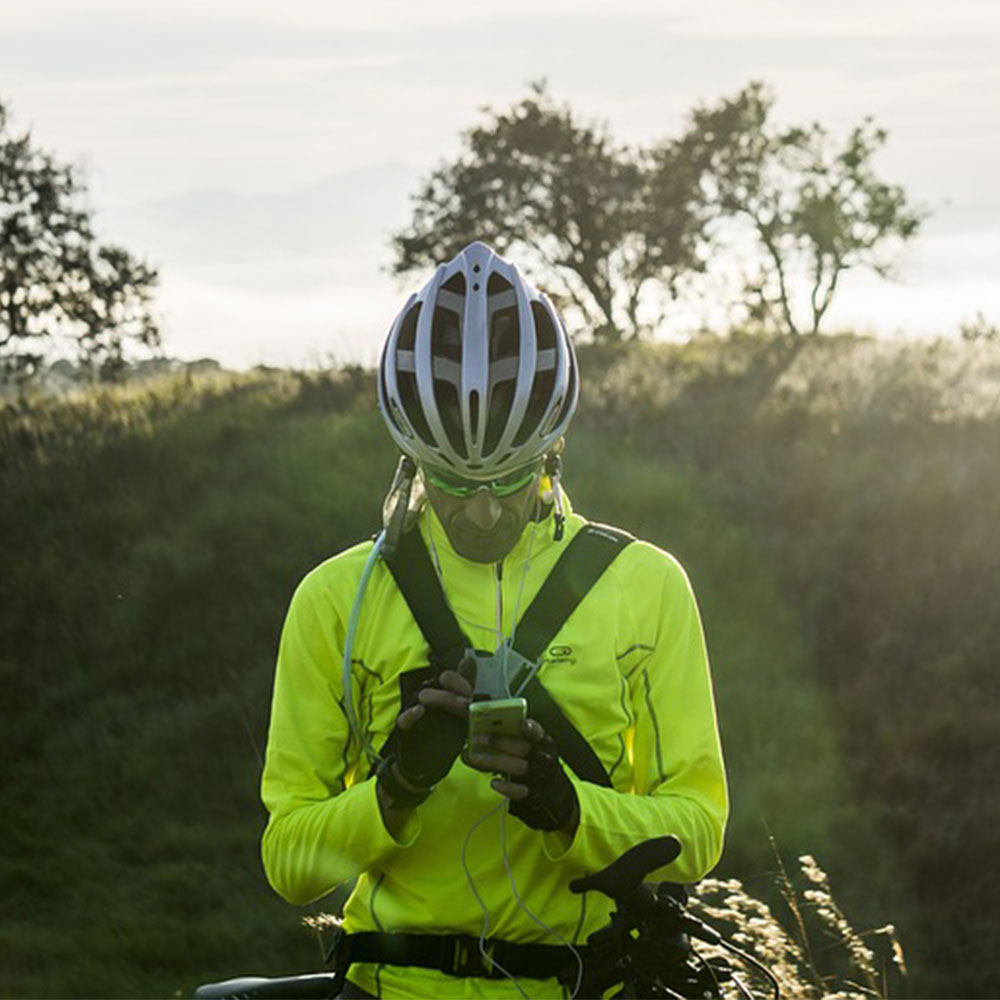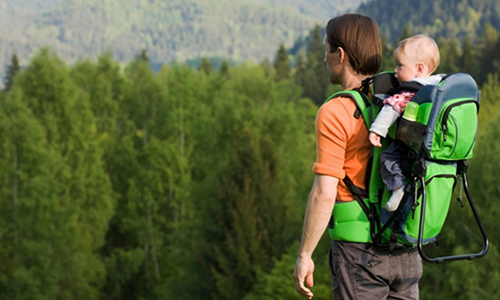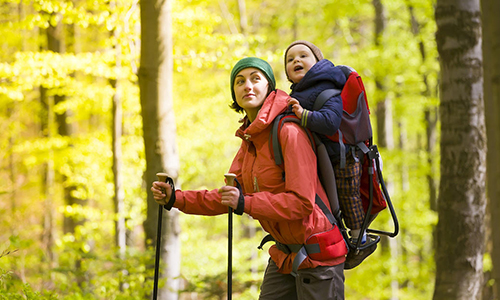Some Hiking Tips For Parents With Toddlers
Author

Chris shares his passion for cycling, hiking, skiing, and climbing from Buxton, in the Peak District. As a blogger for Outdoor Look, Chris shares outdoor tips and indoor tricks to help you get the most out of your time spent outside. When he's not out adventuring he's making videos or trying to keep up with his 4-year-old son.
 When a baby is born, parents are engulfed with countless fears and questions about hiking. What kind of gear do I need? How long a trip should I plan? And most importantly, how old should my baby be before I start hiking with him or her?
When a baby is born, parents are engulfed with countless fears and questions about hiking. What kind of gear do I need? How long a trip should I plan? And most importantly, how old should my baby be before I start hiking with him or her?
Here are some steps that would come in handy if the new parents are planning a hike.
Go slow: You don’t need to plan an exhaustive adventure with a toddler beside you. Pick trails which can be accessed easily and are comfortable.
Don’t go for a higher elevation right away: Although babies can adjust to high elevation, but it’s better to increase the elevation slowly and gradually as this would let you know how your baby’s reacting to elevation.
Carriers do matter: Before your baby’s first trip out on a hike, it’s always good to test your carrier and to learn and know how to adjust it. If the baby isn’t comfortable, you’d be subjected to thunderous screams and hauls for much of the hike. Make sure the baby’s legs aren’t dangling in the carrier on a windy day.
Family comes first: Go with your family or with a friend when you start as it’d be much easier to control the baby. Going with the entire family allows you to have someone to fall back onto.
Bring a good amount of baby wipes: It is advisable to carry a small bag containing at least 10-15 wipes even if you’re only undertaking a two-hour hike. These will come in handy while dealing with dirt that might fly up, dirty hands or an unexpected nappy change. It's best to replenish your inventories before every hike.
 Don’t let a bad day get the better of you: If you’re having a day that is not going the way you want it to go, don’t let it demoralise you. Try again for the next day and keep pushing the envelope. Set a date for your next hike immediately after a bad day so you don’t delay.
Don’t let a bad day get the better of you: If you’re having a day that is not going the way you want it to go, don’t let it demoralise you. Try again for the next day and keep pushing the envelope. Set a date for your next hike immediately after a bad day so you don’t delay.
Don’t overload the backpack: Don’t flood your backpack with unnecessary luggage, but don’t forget the necessities for instance, a lightweight rain jacket, an energy-boosting snack, and water. It could be good to consider carrying a small fanny pack or a lightweight backpack, which can be carried easily. Take a small first-aid kit with you as well in case of any accidents.
Mobile networks are a must: Start with trails that have access to mobile networks in case of emergencies. Even if you don’t think you need the cell service, your loved ones would feel happy if they get to know you’ve returned safely.
Don’t worry too much about the weather: You can bring a few layers if you feel the weather’s treacherous. That said, if there’s a heavy downpour lurking behind the grey skies, think about hikes with shelters along the way. Also, as you’re planning your trip, keep a close eye on the forecast to plan the future course of action.
You can take help from strangers: Now, this might sound a bit difficult if you’re an introvert, but people are likely to soften if they see you carrying a baby on the hike. There’s absolutely no harm in asking random people to buckle up the back of your carrier.
It’s all about goals: Look for groups like Women Who Hike, Girls Who Hike, Adventure Mamas and more.
Author

Chris shares his passion for cycling, hiking, skiing, and climbing from Buxton, in the Peak District. As a blogger for Outdoor Look, Chris shares outdoor tips and indoor tricks to help you get the most out of your time spent outside. When he's not out adventuring he's making videos or trying to keep up with his 4-year-old son.
- Speed Up Your Post-Hike Recovery with These 6 Essential Tips
- Cycling through Tranquil Roads and Coastal Views on the Isle of Wight
- The Essential Guide to Hiking Safety: 5 Tips Every Hiker Should Know
- Run Smart, Run Strong: Your Guide to Injury-Free Running
- Embrace Biking: Essential Tips for Beginners
Categories
- Sport (28)
- Product Reviews (3)
- Team Outdoor Look (7)
- Mike Wild (2)
- Mike Payton (2)
- Suse Hammond-Pears (3)
- Snowboarding (12)
- Latest Offers (105)
- Shop Talk (1)
- Competitions (7)
- Walking (413)
- Lifestyle Fashion (8)
- Travel (86)
- Kit Guides (176)
- Workwear Clothing (6)
- Safety Workwear (4)
- Health/Fitness (289)
- Skiing (91)
- Great Outdoors (1316)
- Cycling (92)
- January 2025
- December 2024
- November 2024
- October 2024
- September 2024
- August 2024
- July 2024
- June 2024
- May 2024
- April 2024
- March 2024
- February 2024
- January 2024
- December 2023
- November 2023
- October 2023
- September 2023
- August 2023
- July 2023
- June 2023
- May 2023
- April 2023
- March 2023
- February 2023
- January 2023
- December 2022
- November 2022
- October 2022
- September 2022
- August 2022
- July 2022
- June 2022
- May 2022
- April 2022
- March 2022
- February 2022
- January 2022
- December 2021
- November 2021
- October 2021
- September 2021
- August 2021
- July 2021
- June 2021
- May 2021
- April 2021
- March 2021
- February 2021
- January 2021
- December 2020
- November 2020
- October 2020
- September 2020
- August 2020
- July 2020
- June 2020
- May 2020
- April 2020
- March 2020
- February 2020
- January 2020
- December 2019
- November 2019
- October 2019
- September 2019
- August 2019
- July 2019
- June 2019
- May 2019
- April 2019
- March 2019
- February 2019
- January 2019
- December 2018
- November 2018
- October 2018
- September 2018
- August 2018
- July 2018
- June 2018
- May 2018
- April 2018
- March 2018
- February 2018
- January 2018
- December 2017
- November 2017
- October 2017
- September 2017
- August 2017
- July 2017
- June 2017
- May 2017
- April 2017
- March 2017
- February 2017
- January 2017
- December 2016
- November 2016
- October 2016
- September 2016
- August 2016
- July 2016
- June 2016
- May 2016
- April 2016
- March 2016
- February 2016
- January 2016
- December 2015
- November 2015
- October 2015
- September 2015
- August 2015
- July 2015
- June 2015
- May 2015
- April 2015
- March 2015
- February 2015
- January 2015
- December 2014
- November 2014
- October 2014
- September 2014
- August 2014
- July 2014
- June 2014
- May 2014
- April 2014
- March 2014
- February 2014
- January 2014
- December 2013
- November 2013
- October 2013
- September 2013
- August 2013
- July 2013
- June 2013
- May 2013
- April 2013
- March 2013
- February 2013
- January 2013
- December 2012
- November 2012
- October 2012
- September 2012
- August 2012
- July 2012
- June 2012
- May 2012
- April 2012
- March 2012
- February 2012
- January 2012
- December 2011
- November 2011
- October 2011
- September 2011
- August 2011
- May 2010
- April 2010
- March 2010
- February 2010
- January 2010
- November 2009
- October 2009
- September 2009
Submit a Comment